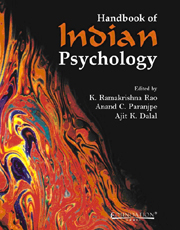Book contents
- Frontmatter
- Contents
- Contributing Authors
- Preface
- 01 Prologue: Introducing Indian Psychology
- 02 Indian Thought and Tradition: A Psychohistorical Perspective
- PART I SYSTEMS AND SCHOOLS
- 03 Jaina Psychology
- 04 The Foundations of Early Buddhist Psychology
- 05 Varieties of Cognition in Early Buddhism
- 06 A Buddhist Theory of Unconscious Mind (Ālaya-Vijñāna)
- 07 Indian Buddhist Theories of Persons
- 08 Buddhist Psychology: A Western Interpretation
- 09 Transpersonal Psychology in the Bhagavad-Gītā: Reflections on Consciousness, Meditation, Work and Love
- 10 Yoga Psychology: Theory and Application
- 11 Patañjali Yoga and Siddhis: Their Relevance to Parapsychological Theory and Research
- 12 Yoga Psychology and the, Sāṃkhyā Metaphysic
- 13 Psychology in the Advaita Vedānta
- 14 The Nyāya-Vaiśeṣika Theory of Perceiving the World of our Experience
- 15 Psychological Theories and Practices in Āyurveda
- PART II TOPICS AND THEMES
- PART III APPLICATIONS AND IMPLICATIONS
- Pronunciation and Transliteration of Sanskrit Alphabet
- Glossary
- Index
12 - Yoga Psychology and the, Sāṃkhyā Metaphysic
from PART I - SYSTEMS AND SCHOOLS
Published online by Cambridge University Press: 26 October 2011
- Frontmatter
- Contents
- Contributing Authors
- Preface
- 01 Prologue: Introducing Indian Psychology
- 02 Indian Thought and Tradition: A Psychohistorical Perspective
- PART I SYSTEMS AND SCHOOLS
- 03 Jaina Psychology
- 04 The Foundations of Early Buddhist Psychology
- 05 Varieties of Cognition in Early Buddhism
- 06 A Buddhist Theory of Unconscious Mind (Ālaya-Vijñāna)
- 07 Indian Buddhist Theories of Persons
- 08 Buddhist Psychology: A Western Interpretation
- 09 Transpersonal Psychology in the Bhagavad-Gītā: Reflections on Consciousness, Meditation, Work and Love
- 10 Yoga Psychology: Theory and Application
- 11 Patañjali Yoga and Siddhis: Their Relevance to Parapsychological Theory and Research
- 12 Yoga Psychology and the, Sāṃkhyā Metaphysic
- 13 Psychology in the Advaita Vedānta
- 14 The Nyāya-Vaiśeṣika Theory of Perceiving the World of our Experience
- 15 Psychological Theories and Practices in Āyurveda
- PART II TOPICS AND THEMES
- PART III APPLICATIONS AND IMPLICATIONS
- Pronunciation and Transliteration of Sanskrit Alphabet
- Glossary
- Index
Summary
Yoga is experiencing renewed interest in the West, but the philosophy accompanying the actual techniques appears to be derived more from the Vedāntic interpretation of the original Yoga texts, rather than that of the Sāṃkhyā metaphysic. According to Hindu scholars from Surendranath Dasgupta and Sarvepalli Radhakrishnan to Heinrich Zimmer, James Houghton Woods, and others, Sāṃkhyā was Patañjali's original choice for a conceptual framework to help the adept understand the nature of states of consciousness experienced. But does it really matter which philosophy it is?
This paper compares the metaphysics of Sāṃkhyā and Vedānta with respect to their differing interpretations of Patañjali's Yoga-Sūtras in order to estimate the dependence of Yoga psychology on the Sāṃkhyā metaphysic. The authors argue that the Vedāntic interpretation leads to a monistic conception of consciousness compatible with Western monotheism, hence its missionary value. Meanwhile, the Sāṃkhyā reflects the eventual consequence or fruit of the state of samādhi as kaivalya, or isolation of pure consciousness from lifeless inert matter. Described as a more indigenous aspect of Yoga psychology, kaivalya, and much of the Sāṃkhyā, still remain largely incomprehensible to most Westerners.
Yoga is properly understood as one of the six orthodox philosophical systems as well as a practise for transforming personal consciousness. As such, it is possibly the single most important contribution of Hindu culture to world mental health. Its efficacy is accepted by virtually all the other orthodox Hindu schools, it pervades both Buddhism and Jainism, it is the hallmark of the tantra, and through the proliferation of such strands, an indigenous Chinese Yoga of Taoist origin notwithstanding, its influence has spread to every corner of Asian culture.
- Type
- Chapter
- Information
- Handbook of Indian Psychology , pp. 244 - 252Publisher: Foundation BooksPrint publication year: 2008

